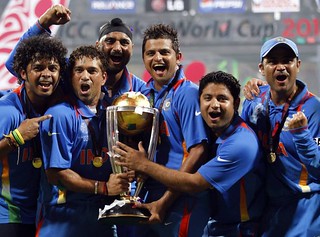2nd April 2011, Saturday night. India lifted the cricket world cup …and we were in a frenzy of celebration! It was a “dream come true” moment for team India and many of us across the country. An utterly delicious icing to the cake….the cake being our win over Pakistan. MS Dhoni made a particularly interesting comment about cricket fans’ expectations after their win against Australia in the quarter finals – “we don’t care about the finals, just win the SEMI-FINALS!!”. Why not? Ind/Pak clashes are always mouth-watering….probably even more than the match where we actually bagged the cup. Let us think about this…which match instantly stirred up a bigger adrenaline rush in us and meant sheer excitement? Ind-Pak or Ind-Sri Lanka? For most of us, the answer would be the former. Why so?
Well, the long history of friction between India and Pakistan immediately comes to mind. Add to that the numerous terrorist attacks on our nation, which have left many of us furious and helpless all at once. Events such as these leave us with a lot of negative emotionality with no outlet… or rather, with but one outlet – the cricket field.
This widely appreciated reason could arise from certain deep, unconscious, psychological defense mechanisms we often engage in without knowing so. These mechanisms could be thought of as coping strategies our mind silently employs, often without our awareness. Two relevant mechanisms could be “displaced aggression” and “sublimation”.
What is Displaced Aggression?
Displaced Aggression is defined as ‘ aggression against someone other than the source of strong provocation; it occurs because the persons who perform it are unwilling or unable to aggress against the initial source of provocation.’ (Baron & Byrne, 2004)
Common examples are reprimanding a subordinate when angry with our superior, hitting a pillow when in an argument with family, taunting a friend when angry with one’s partner etc.
Another example would be hoping the Pakistani cricket team loses to the men in blue when we are angered at the long history of conflict with Pakistan. Because we cannot aggress directly against the direct source of provocation, we redirect our sub-conscious psychic energy and hope with all our hearts that India wins against Pakistan. This could explain the increased pressure the team faces ahead of a match against Pakistan. This could also explain all the arrangements we make to soak in every moment of the match, our being on the edge for every ball, our decibel levels at every wicket, every four and six….the sheer revelry and celebration….and the feeling of vindication whenever India wins against Pakistan.
Well, in addition to displaced aggression, there is another, perhaps happier mechanism involved here, the defense mechanism of ‘sublimation’.
What is Sublimation?
Sublimation is defined as ‘ a defense mechanism whereby a repressed or unconscious drive that is denied gratification is diverted into a more acceptable channel or form of expression.’ (Colman, 2006)
Examples are when a girl who is single satisfies her own need for a relationship indirectly by helping her friend have a healthy relationship, or when a boy satisfies his need for aggression by watching his favorite hero bash the villain up in a movie.
Similarly, we may channel our need for aggression against the direct perpetrators of destruction into cricket…and why not? Cricket offers us a safer, happier zone to express frustration. Direct aggression would mean violence, guilt, unrest and emotional turmoil. People would be hurt, there could be dire consequences, it would probably entail doing something that perhaps goes against our conscience. A cricket match on the contrary only means entertainment and excitement. It also means bonding with friends, forgetting our worries and celebrating to no end over a win. It means being very happy, fear-free and guilt-free while aggressing and being vindicated. “Happy aggression” sounds like a paradox doesn’t it? Nevertheless, it is true. Such is the potency of the human mind.
References:
Baron R.A. & Byrne D. (2004), Social Psychology. Tenth Edition, Prentice Hall of India Private Limited, New Delhi
Colman A.M. (2006), Oxford Dictionary of Psychology. Second Edition, Oxford University Press.
Image Courtsey : Flickr
Post contributed by: Malini Krishnan (Psychologist, Inner Space, 2010-Present)

